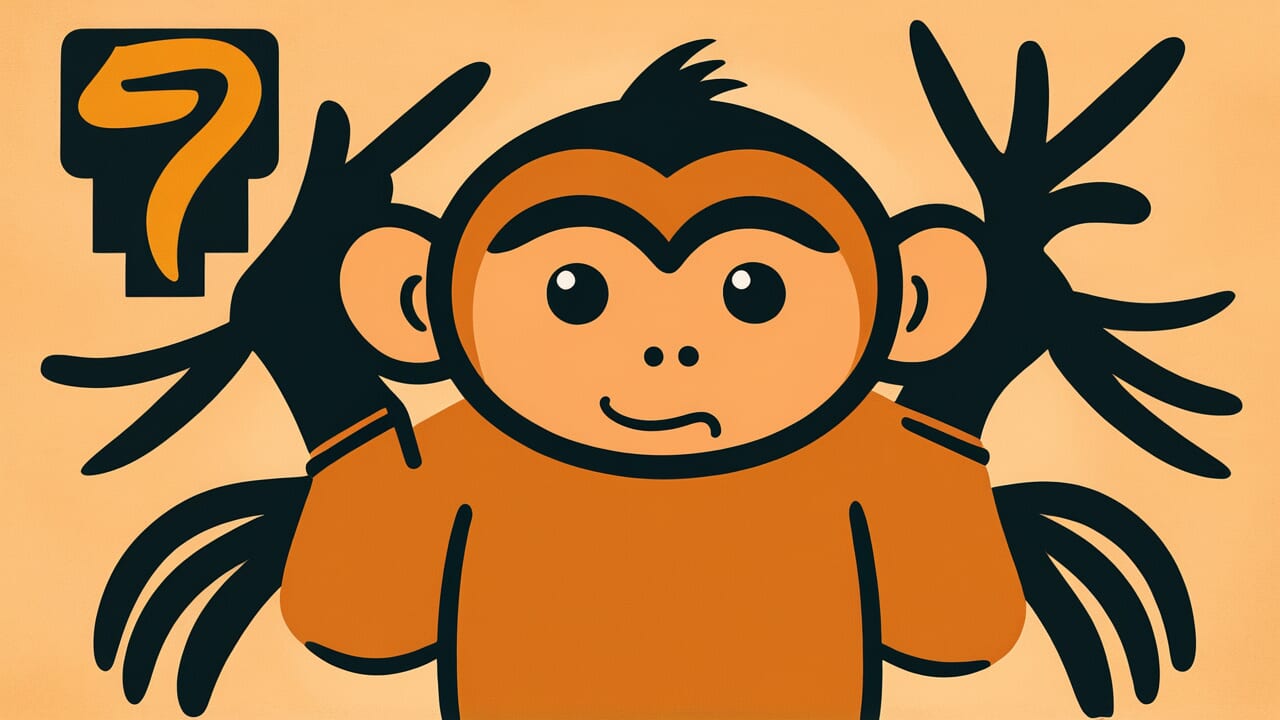How to Read “A monkey is only three hairs short of being human”
Saru wa ningen ni ke ga mi-suji taranu
Meaning of “A monkey is only three hairs short of being human”
This proverb means the difference between monkeys and humans is tiny. Humans are not so different from monkeys after all.
It warns against human arrogance. People often think they are special and look down on other living creatures. This saying reminds us not to act superior.
You use this proverb when people act proud or think only humans are superior. For example, when someone does something foolish or acts purely on instinct, you might say, “Well, a monkey is only three hairs short of being human.”
In modern times, this expression aligns with scientific understanding. No matter how advanced our civilization becomes, human desires and instincts remain similar to other animals. Our fundamental nature has not changed much.
Origin and Etymology
The exact origin of this proverb is unclear. However, the structure of the phrase offers interesting insights.
The expression “three hairs short” emphasizes an extremely small difference. It suggests monkeys and humans differ by only three strands of hair.
During the Edo period, people recognized monkeys as the animals closest to humans. Monkey performances were popular entertainment. People noticed how monkey gestures and expressions closely resembled human behavior.
From these observations, expressions warning against human arrogance likely emerged.
The specific number “three” is also noteworthy. In traditional Japanese expressions, “three” often represents “a small amount.” You see this in phrases like “mikka bouzu” (three-day monk) meaning someone who quits quickly.
Here, “three strands” does not mean literally three hairs. It is a metaphor meaning “just a tiny bit.”
This proverb teaches humility. Humans tend to consider themselves special. But the difference between humans and animals is paper-thin.
Even before evolutionary theory spread, Japanese people intuitively understood the closeness between humans and animals. This proverb reflects that ancient wisdom.
Usage Examples
- That politician is just acting out of self-interest. A monkey is only three hairs short of being human, after all.
- Even when people say noble things, they cannot overcome their instincts. A monkey is only three hairs short of being human, as they say.
Universal Wisdom
This proverb has endured because it sharply perceives human nature. We have built civilizations, created advanced technology, and established complex social systems.
Yet beneath that impressive surface, primitive desires still flow. Hunger, sexual desire, the urge to dominate—these remain alive in us.
Humans like to see themselves as special. We pride ourselves on having reason, morality, and culture. But history repeatedly proves that reason crumbles easily in crisis. When danger strikes, instinct takes over.
War, plunder, discrimination—all these show that humans are only “three hairs more” than monkeys.
Our ancestors had the courage to face this truth. They did not glorify humans excessively, nor did they demean them. They accepted reality as it is.
This acceptance contains deep humility. Only by knowing our limits can we truly grow.
This proverb warns against human arrogance. At the same time, it invites self-understanding. We are not perfect. We have animal aspects.
Acknowledging this fact may actually be the first step toward living more humanely.
When AI Hears This
Human and chimpanzee DNA sequences are 98.8% identical. Only a 1.2% difference exists. Yet this “only” marks the boundary between creating language, inventing writing, launching rockets into space—and not being able to do any of that.
What matters here is a phenomenon called “nonlinearity” in genetics. The amount of change does not match the size of the result.
Think of water temperature. Raising it from 99 to 100 degrees—just one degree—transforms liquid into gas. Similarly, tiny genetic differences create decisive functional splits.
Consider the FOXP2 gene involved in human brain development. It differs from chimpanzees by only two amino acids. Yet this microscopic difference enabled complex vocalization and language acquisition.
Even more fascinating is the HAR1 genetic region. For millions of years, it barely changed. Then in the human lineage, it rapidly mutated at 18 locations. This brought dramatic expansion of the cerebral cortex.
The “three hairs” expression in this proverb is scientifically remarkably accurate. The essential difference is not quantity but crossing a critical threshold.
Ancient people intuitively understood this. They grasped where the minimal switch exists that qualitatively transforms an entire system.
Lessons for Today
This proverb teaches modern people the importance of humility. When we gain knowledge, status, or wealth, we easily fall into thinking we are special.
But no matter how successful you become, your fundamental nature does not change. When hungry, you get irritable. When tired, your judgment weakens. Driven by desire, you sometimes make mistakes.
This recognition is not meant to make you feel inferior. Rather, knowing your limits helps you live more wisely.
You do not need to pretend to be perfect. When you fail, you can forgive yourself by saying, “I’m only human.” At the same time, you can become more tolerant of others’ mistakes.
In modern society, presenting a perfect image on social media has become normal. But behind that facade, animal anxieties and desires swirl.
Acknowledging this actually lightens your heart. You do not need to be perfect. Being just human is enough.
When you can think this way, you become truly free.



Comments